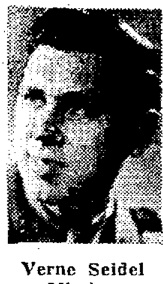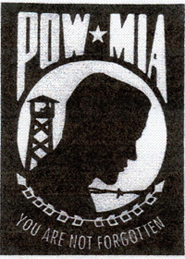Wagner Killed in Africa; Seidel, Fortune Missing
One Waterloo soldier was listed as killed in action and two others were reported missing Wednesday in War Department advices to their families here.
All three were north African battle front casualties.
Killed in action Feb. 20, 1943 the War Department announced was Pvt. Joseph M. Wagner, jr., 24 son of Mr. and Mrs. Joseph M. Wagner, 1331 Sycamore street, an anti-tank division member.
Missing were Technician, Fifth Grade, Verne M. Seidel, 25, son of Mr. and Mrs. J. Martin Seidel, 1711 West Third street, and Pfc. Merrill L. Fortune, 20, son of Mr. and Mrs. Irving W. Fortune, 303 Bratnober street.
Both Seidel and Fortune were listed as missing, Feb. 17.
West Basketball Player.
Seidel, a former West high school basketball player, was serving with an army medical unit. Fortune was with the infantry in north Africa as a truck driver.
The War Department disclosed no further details in any of the three telegrams it sent to the families of the men.
Private Wagner enlisted for service in December, 1940, as a member of a Waterloo national guard unit. He left with his company in February, 1941, and trained at Camp Claiborne, La., before sailing for north Ireland in January, 1942.
Then to Africa.
He was reported in north Africa with American forces Jan. 4, 1943.
Before enlistment, Wagner was employed four years by the Powers Manufacturing Company.
He was a 1934 graduate of St. John’s parochial school.
Surviving him are his parents and a brother, Charles William, at 1331 Sycamore; a brother, Corp. Stanton Wagner, now with the quartermaster corps at Miami, Fla.; and the maternal grandmother, Mrs. Jennie Quail, Maywood Addition.
Technician Seidel was inducted May 28, 1941, took his basic training at Camp Claiborne, La., and went to north Ireland in March 1942, attached to a medical unit. He had been in north Africa since November, 1942.
Attended T. C.
A 1935 graduate of West High, Seidel later attended the Iowa State Teachers College, Cedar Falls, and was employed as a timekeeper in offices of the Rath Packing Company before entering the service.
His brother, Sgt. Vic Seidel, is now stationed somewhere in Australia.
A sister, Betty, is a West High senior.
Source: Waterloo Daily Courier, March 10, 1943 (photos of all three men included)
![]()
GOLD STAR HOMES SAY RATIONING NO HARDSHIP AT ALL
Waterloo families whose boys have been killed or reported missing in action are considering food rationing only a small gesture of patriotism. Gold Stars are numerous now and their number is steadily mounting. And these gold star families are feeling far greater emptiness in their homes than the partial emptiness in their cupboards or their refrigerators.
Mother of another boy reported missing in action since Feb. 17, is Mrs. Martin Seidel, 1711 West Third street. Her son, Technician Fifth Grade Verne Seidel, has been on the African battle front, having been overseas a year.
Mrs. Seidel said:
“We’re just taking this rationing in our stride. It’s not such a hardship. I’m willing to do lots more if it will help the boys overseas.”
Relinquishing a steak or two a week, giving up an extra helping of one’s favorite vegetable or fruit, going without a second teaspoonful of sugar in the coffee, and the extra cookies and cakes, are small forfeits for freedom. They become even smaller by comparison when one considers the lives which are being exchanged for the safety of our heritage.
Source: Waterloo Sunday Courier, March 28, 1943
![]()
VERNE SEIDEL IS PRISONER IN GERMAN CAMP
Verne Seidel, 25, technician fifth grade, who has been reported missing since Feb. 17, is now a prisoner in a German camp, according to a message received by his parents, Mr. and Mrs. J. Martin Seidel, 1711 West Third street.
“Yep, this is your boy, and I am getting around, [two lines illegible] I was captured by the enemy on 17th of February and [more illegible lines.]
“I did my first flying [2 words illegible] the axis. So far we have been treated surprisingly well. My waistline is decreasing daily, but living conditions aren’t bad. I feel swell and with all the boys here I get along very well.
“The time is beginning to drag already,” he told his parents. “We are allowed a limited number of cards and letters each month. I was a little downhearted at first, but I am lucky to be alive today.”
Seidel, a former West High School basketball player was serving with an army medical unit at the time of his capture.
Before entering service, he was employed as a timekeeper in offices of the Rath Packing Company. His brother, Sgt. Vic Seidel, is now stationed somewhere in Australia.
Source: Waterloo Daily Courier, April 30, 1943
![]()
Steady Stream of Overseas Packages Is Morale Builder for Waterloo Service Men
PACIFIC PARCELS.
In the Pacific, the service man wants cigarette lighters, pipe cleaners, pens, flashlights, extra wool perspirations-absorbing socks, and any edibles packed in sealed-tight containers.
If your son is a German prisoner, as is Cpl. Verne Seidel, son of Mr. and Mrs. J. M. Seidel, 1711 West Third street, then you are perhaps faced with a more difficult and complicated job in sending your son packages through the Red Cross and government official channels. But perhaps, too, that package is doubly welcome.
Mrs. Seidel will be delighted to learn that today Mrs. Ray Paul, chairman of the Black Hawk county Red Cross chapter prisoner of war committee, announced that heavy cardboard cartons especially designed for prisoner of war gift packages are available without cost at the chapter offices. The Red Cross, in conjunction with the government, is, through these means, opening a campaign against damaged and delayed packages, weak containers and those which do not conform to size and weight qualifications.
War correspondents returning from the various theaters of war have seen many a soldier open a package which traveled thousands of miles only to find the contents ruined or useless.
PRISONER PACKAGES.
But Mrs. Seidel, whose son was taken prisoner Feb. 16, 1943, in Africa, has learned much of the intricate business of prisoner of war mail. Each 60 days she receives two permits from Col. Howard F. Bresee, assistant director of the prisoner of war division of the government, one to be placed on the outside and one on the inside of her package. This is the only way in which packages may be mailed to prisoners.
Specific instructions—pages of them—are enclosed with the letter to insure the package’s filling requirements, in addition to setting forth suggestions for useful gifts. It takes many months for the boxes to arrive at Stalag 3-B, the internment camp where Corporal Seidel is stationed, but so far he has received each box, at a maximum weight of 11 pounds. Mrs. Seidel must also present a card at the postoffice, listing the items in her box, in addition to the other labels sent her by the government.
It is a complicated business, this sending of packages to men overseas and to prisoners in enemy territory, but somehow, mentally, each mother, sister and wife as she wraps her package can see the hope in his eyes as he opens it. And then the gift becomes a priceless link across the long silence, keeping a family circle strong and intact.
Source: Waterloo Sunday Courier, July 2, 1944
![]()
22 Iowans Home from Nazi War Prisoner Camps
Des Moines—Thursday was homecoming day for 22 Iowans who have been released by the Germans after many months in war prisoner camps.
All of the men were from medical detachments, which, according to Pfc. Robert J. Houghton, Des Moines, probably figured in the explanation of their release. None was wounded.
“We were just 75 lucky men the Germans said could go home.” Houghton said. “I don’t understand it myself.”
He said the Iowa men who returned with him were Melvin Owen, Tipton: John Ondrejka, Fort Dodge; B.K. Smokstad, Monroe; H. Bilterman, Aver; Benjamin Salvetore, Fort Dodge; Marion DeVries, Orange City; Dale Reichert, Fort Dodge; Verne Seidel, Waterloo; Avron Gaulke, Dows; Joe Hayes, Correctionville; Charles Slavens, Cincinnati; John Terris, Dubuque; Russell Sparks, Maxwell; Charles Minor, Lamoni; Vincent White, Marshalltown; Morris James, Newton; John Spiegel, Sioux City and Clifton Warner, Des Moines.
Delayed but on the way home, he said, were Robert Tadewald, Muscatine and Ansel Maughler, Troy. The group also included Richard Clarke, who entered the army from Des Moines but who now lives at Millersburg, Ind.
Source: The Sioux City Journal, March 9, 1945
![]()
Previously reported liberated from German prison camp was Tech. 5th Gr. Verne Seidel, son of Mr. and Mrs. J. M. Seidel, 1711 West Third street, who was the first released Waterloo soldier to arrive home for a furlough, coming on March 8.
Source: Waterloo Daily Courier, April 20, 1945
![]()


